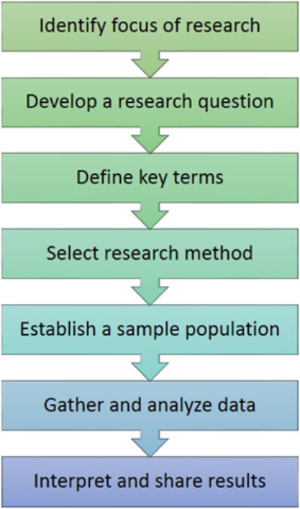Introduction

The start of a research project can be overwhelming. Fortunately, the Purdue Online Writing Lab is a great resource to walk you through the process. It hosts information about:
- Starting the process;
- Finding, evaluating, and citing sources; and
- Writing your paper
Choosing a Topic
You may choose any subject covered by the course (20th Century World History). You should consider tying your interests with your topic. For example, if you were enrolled in World History after 1500 C.E.:
- If you are interested in horses, you could do a paper on the horse culture of the Arapahoe Indians
- If you plan a career in finance, you could do a paper on Alexander Hamilton’s fiscal policies under the Washington administration.
It is important to choose a topic that is narrow and deep. If your topic is too broad and encyclopedic, you will not be able to limit your paper to 5-7 pages (1500-2100 words). There are ways to narrow your topic:
- By time (specify a few years)
- By individual (not all Native Americans, but Tecumseh)
- By location (not all of China, but Shanghai)
- By social class or institution (not all citizens, but the working poor; not all Muslims, but the Sufi)
Some examples of topics:
Poor topic: The Salem Witch Trials
Good topic: The role of Tituba in the Salem Witch Trials
Poor topic: Thomas Jefferson
Good topic: Jefferson’s interest in horticulture
Poor topic: Wars with Native Americans
Good topic: The Pontiac Rebellion
If you need inspiration, look through the Library of Congress Collections. Remember choosing a topic is tough, and even professional historians struggle to narrow their topics. Be patient and ask for advice.
Research and Process
The seven steps outline is a simple and effective strategy for moving from the beginning of a research project to the finished product. Depending on your topic and your familiarity with library and Internet resources, you may need to rearrange or recycle these steps (Cash).
1. Start with a Plan
2. Identify and Develop a Topic
3. Develop a Research Strategy
4. Find Background Information
5. Find High Quality Resources
6. Evaluate What You Find
7. Cite Your Sources
Writing is a process, one we must practice continuously to improve. As you begin the assignments in this course, keep the following tips in mind (Purdue):
1. Writing takes time
2. Use the rhetorical elements from the assignment as a guide
3. Keep in mind the purpose of the assignment
4. Just start writing – use pre-writing strategies!
Knowledge Check
Use the following ungraded, self-check question to confirm your learning for this section.
References
Cash, Mary. “Doing Research at a Distance: A Seven Step Process.” CCCOnline Library. Accessed July 30, 2018. http://ccconline.libguides.com/ResearchDistance.
Purdue. “Conducting Research.” Purdue Online Writing Lab. Accessed July 30, 2018. https://owl.purdue.edu/owl/research_and_citation/conducting_research/conducting_research_introduction.html.
Purdue. “General Writing Resources.” Purdue Online Writing Lab. Accessed July 30, 2018. https://owl.purdue.edu/owl/general_writing/the_writing_process/invention_starting_the_writing_process.html.
